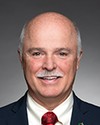Madam Speaker, I will be sharing my time with the hon. member for Mission—Matsqui—Abbotsford.
I was pleased to second this Conservative opposition day motion, because six months ago, the Prime Minister told Canadians to judge him by the costs at the grocery store. In the last six months, Canadians have looked at the price of grocery store items. We will go through that in just a moment.
I rise to speak out today on behalf of all the Canadians we represent. They are experiencing extreme hardship as a result of the failed Liberal policies of the last 10 years. The Liberals say they are a new government, but they are not. It is the same government that came in in 2015. The Liberal government is not hearing the general public. The Liberals are telling Canadians, as we have heard all day, that they have never had it so good.
Poverty and food insecurity in this country have risen almost 40% in the last two years. The reality is very grim. If members have ever had the opportunity to visit a local grocery store to put food on the table for their family, it is a road show. I watch families when I am there. They stop, and the first thing they look for is specials, the second thing they look for is 50%-off items and the third thing they look for is expired items because they have been reduced. I sit and watch people in our grocery stores in Saskatoon, where I am from. It is amazing to watch them. I am really worried, and I fear for parents. Do they have enough money at the end of the month to put a decent meal on the table?
Food inflation, as we all know, is 70% above the Bank of Canada's target. Food prices are up 40% since the Liberals took office 10 years ago. The Prime Minister told Canadians that they could measure his performance by the prices at the grocery store. That is why we have this opposition day motion.
The horror show at the grocery store is the meat department. When people go through the meat department, they stop and ask whether they can afford a roast. They open the freezer and then shut the freezer. Why? It is because they cannot afford the price of beef. It is up 33%. I have seen it in grocery stores from coast to coast.
We have heard the numbers, but just let them sink in. If someone puts a stew in their crockpot today, they will have to pay between 11% and 33% more just for the ingredients in that crockpot. Normally, it would be a lesser grade of beef going into the crockpot, but that still makes it 11% to 33% more.
I have watched shoppers all over at our grocery stores. I just mentioned the meat, and they obviously cannot afford it. The items we put in our cart at the grocery store are up across the board, from 9% to 33%.
Saskatchewan, the province I am honoured to call home, has long been called the world's food basket. Saskatchewan feeds not only this country but the world. I am going to give a shout-out. The harvest in my province is 68% complete right now, so many families are still in the fields. We wish them a very safe and prosperous harvest season. We still have over 30% to be put into the bin. We wish them all the best.
Farmers are struggling more than ever just to produce the food we need not only in this country but around the world. The total net farm income decreased by $5.2 billion in 2024. That is over 40% from the year before. In Saskatchewan, it is down 36.1%. How can we expect farmers to survive and then thrive with a third of their income gone in the last two years? Stats Canada reports that the realized net income for Canadian farmers fell by $3.3 billion, or 25%, to $9.4 billion just in 2024. There are many reasons for that, and we will get into them.
My wife, Ann, and I were honoured this August when we were asked to come to a Hutterite colony in Saskatchewan. I will not name it, but it was in southern Saskatchewan. I have many friends in the Hutterite community, and I see them a lot in Saskatoon, but this is the first time I have ever stepped foot in a Hutterite colony. We went for a long period, for a whole day. It was really interesting, and we enjoyed the experience. I certainly learned a lot.
Farming is changing. It is undergoing huge changes. The colony has to diversify now. It raises chicks and exports them to Lilydale in Wynyard, Saskatchewan. Every 37 days, the chickens are exported to Wynyard, the barns are cleaned and then this process starts all over again. I should add that everything in that facility is automated, from the water to the feed. By the way, the colony in Saskatchewan even produces its own feed because it is a lot cheaper. It is a great way to farm and produce food for all those in Saskatchewan. Also, Costco takes all the colony's chickens in western Canada.
However, the colony has had to diversify. It is now into steel because the prices of grain and canola have come down. When I sat to eat with the colony members, they told me that they felt farming is simply too risky today. There is the price of land and rent prices, as well as the weather and insurance costs. Right now, the colony is renting nine combines, which are changed out every two years. They cannot afford to buy the nine combines, but they can afford the lease every two years.
Liberal policies have had a major effect on this colony in Saskatchewan. I thought I would mention that, because we often drive by these colonies in Alberta, Saskatchewan and Manitoba. They look big and nice and are this and that, but they too are under pressure because of the Liberal policies.
Let us now talk about the food bank in Saskatoon, which is the city I live in. I just told the House that my province is world-leading when it comes to food production, yet we saw a staggering 25% usage in 2024. We feed the world, yet the food bank in Saskatoon saw a staggering 25% increase because of these policies, with 43% of the people relying on the food bank being children. This reflects Saskatoon's high child poverty rate.
The executive director, Laurie O'Connor, said that they are seeing 23,000 visits to the food bank monthly in Saskatoon, for about 8,000 hampers. More middle-class-income families are making their way to the food bank in Saskatoon, which is causing more demand. It is also being used by seniors and students. Students are back at the university, at Saskatchewan Polytechnic, and they too are making their way to the food bank now. They simply cannot afford everyday living costs.
Almost all grocery stores in our province have a bin at the door for food donations, which are given back to each community's food bank. The 23,000 visitors per month is an all-time high. I have volunteered for the food bank in the city I live in, and I never would have expected in my life for 23,000 people to come through the door of the Saskatoon food bank.
I hope that the Prime Minister is listening to this today. Michael Kincade is the Food Banks of Saskatchewan executive director. He summed things up beautifully when he said, “By the time somebody goes to use a food bank [in my province], they've already starved.” We should think about that.















